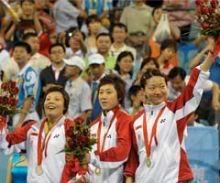Matthias Chia / Guest Writer
 Singapore has just celebrated its recent success at the Beijing Olympics, with our first medal since independence coming from our team of foreign sport talents. Yet, with the ongoing debate on whether or not we should accept foreign sports talent in Singapore, one tends to overlook the athlete’s point of view. Behind every success story of a Li Jia Wei lies a sad story of Zhang Xue Ling or an even lesser known Singaporean athlete.
Singapore has just celebrated its recent success at the Beijing Olympics, with our first medal since independence coming from our team of foreign sport talents. Yet, with the ongoing debate on whether or not we should accept foreign sports talent in Singapore, one tends to overlook the athlete’s point of view. Behind every success story of a Li Jia Wei lies a sad story of Zhang Xue Ling or an even lesser known Singaporean athlete.
I am not against the foreign sports talent scheme. In fact, I am in full support of its long term aims, of granting citizenship and of ensuring that paddlers like Jing Jun Hong stay on to groom a new generation of sports talent, local or foreign. However, there appears to be a serious problem with the scheme that one may detect, ten years on from its implementation.
Currently, only 37 out of 54 foreign sports talents are active and training in Singapore. A closer peek into some of the reasons these athletes leave seem to reveal a worrying trend for Singapore’s sporting future. Most athletes cite “personal reasons” for leaving Singapore, most notably Zhang Xue Ling and Li Li. However, Zhang Xue Ling was noted to have been dropped out of the last 5 pro-tour competitions before announcing her retirement.
Like what nominated MP Denise Phua said, “This is no longer a case of a few bad apples”. Perhaps one reason to suggest such a blemish on our Foreign Sports Talent Scheme (FST) could be the fact that even amongst the foreign talent camp, many find it hard to earn their keep. Shot putter Luan Wei and Hammer thrower E XiaoXu have both sued SAA for “back pay, loss of earnings and damages to be assessed for their education, including at university level.” Both athletes were booted from the FST scheme after displaying dismal results and not meeting standards set by the SAA. Many other athletes find it hard to make the grade in sports after forsaking their own studies in their hometowns to come to Singapore.
Another possible reason behind the failure of the FST scheme would be the lack of support it gets from Singaporeans. While there remain mixed views on the issue, one thing about foreign sports talent is clear – every spot in our national team taken up by a foreign sports talent is a spot taken away from our local talent. With the influx of the foreign talent in Singapore, precious spots on the national team could be drifting away from our own home grown Singaporeans. Consider the table tennis team that just won us our only medal in 48 years. All three members of the team are foreign-born, with one only given citizenship at the start of this year. Strong sentiments about this issue led to Straits Times correspondent Lee Kai Yin remarking that he can “only think of foreigners brought in by Singapore to win medals” when it comes to the table tennis team.
In our increasingly globalised world, where more than half the world’s table tennis players come from China, foreign sports talent seems set to stay. Yet there still remains a silver lining for local sports talents. My suggestion would be to place restrictions on the proportion of foreign representation in our national team. This would balance out the pragmatist approach to winning a medal with the need for local representation. Also, the number of foreign talents in Singapore would be minimised as the need for them decreases. In addition, now that we have more competent foreign athletes, the government will have to up its quality checks when it comes to importing foreign talents.
It is also important that our Foreign Sports Talent Scheme provides assurances to foreigners if we are to have any chance of attracting the cream of the crop. Lowering the number of foreign talents we need would ensure that every foreigner that we get receives adequate attention. As such, setting a restriction would benefit our sports scene as a whole, with enough local representation as well as competent foreign sports talent.
Ultimately, we need more foreign athletes like Jing Jun Hong who are willing to stay on and train our youngsters. This can be ensured by placing limits on the foreign representation our national team has. As such, let’s hope that by the time London 2012 comes around, our table tennis team would at least have a home grown paddler.
————–
About the author:
Matthias Chia is a 16-year-old student from Raffles Institution. As the vice-captain of the school’s cross country team, he has a keen interest in the foreign sports talent issue. Matthias also enjoys reading, particularly modern history. He is an active member and vice-chairman of the Raffles Debates Club and takes part in current affairs debates.
————


